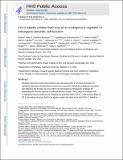Tim-3 adapter protein Bat3 acts as an endogenous regulator of tolerogenic dendritic cell function
Author(s)
Tang, Ruihan; Acharya, Nandini; Subramanian, Ayshwarya; Purohit, Vinee; Tabaka, Marcin; Hou, Yu; He, Danyang; Dixon, Karen O; Lambden, Connor; Xia, Junrong; Rozenblatt-Rosen, Orit; Sobel, Raymond A; Wang, Chao; Regev, Aviv; Anderson, Ana C; Kuchroo, Vijay K; ... Show more Show less
DownloadAccepted version (3.162Mb)
Open Access Policy
Open Access Policy
Creative Commons Attribution-Noncommercial-Share Alike
Terms of use
Metadata
Show full item recordAbstract
<jats:p>Dendritic cells (DCs) sense environmental cues and adopt either an immune-stimulatory or regulatory phenotype, thereby fine-tuning immune responses. Identifying endogenous regulators that determine DC function can thus inform the development of therapeutic strategies for modulating the immune response in different disease contexts. Tim-3 plays an important role in regulating immune responses by inhibiting the activation status and the T cell priming ability of DC in the setting of cancer. Bat3 is an adaptor protein that binds to the tail of Tim-3; therefore, we studied its role in regulating the functional status of DCs. In murine models of autoimmunity (experimental autoimmune encephalomyelitis) and cancer (MC38-OVA–implanted tumor), lack of Bat3 expression in DCs alters the T cell compartment—it decreases T<jats:sub>H</jats:sub>1, T<jats:sub>H</jats:sub>17 and cytotoxic effector cells, increases regulatory T cells, and exhausted CD8<jats:sup>+</jats:sup>tumor-infiltrating lymphocytes, resulting in the attenuation of autoimmunity and acceleration of tumor growth. We found that Bat3 expression levels were differentially regulated by activating versus inhibitory stimuli in DCs, indicating a role for Bat3 in the functional calibration of DC phenotypes. Mechanistically, loss of Bat3 in DCs led to hyperactive unfolded protein response and redirected acetyl–coenzyme A to increase cell intrinsic steroidogenesis. The enhanced steroidogenesis in Bat3-deficient DC suppressed T cell response in a paracrine manner. Our findings identified Bat3 as an endogenous regulator of DC function, which has implications for DC-based immunotherapies.</jats:p>
Date issued
2022Department
Massachusetts Institute of Technology. Department of Biology; Howard Hughes Medical Institute; Koch Institute for Integrative Cancer Research at MITJournal
Science Immunology
Publisher
American Association for the Advancement of Science (AAAS)
Citation
Tang, Ruihan, Acharya, Nandini, Subramanian, Ayshwarya, Purohit, Vinee, Tabaka, Marcin et al. 2022. "Tim-3 adapter protein Bat3 acts as an endogenous regulator of tolerogenic dendritic cell function." Science Immunology, 7 (69).
Version: Author's final manuscript